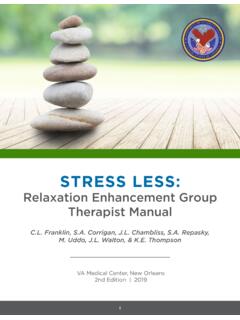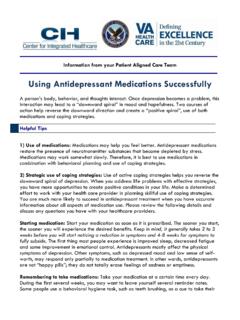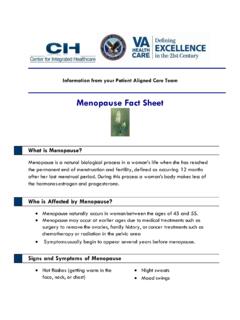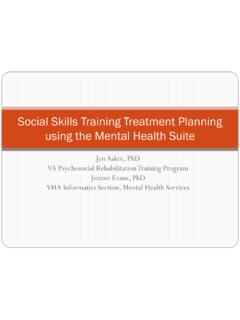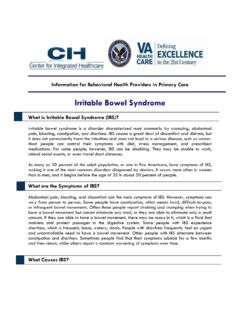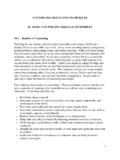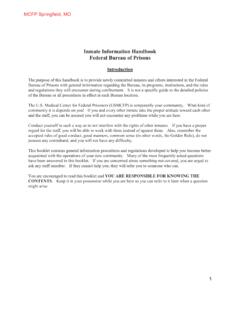Transcription of Erectile Dysfunction (ED) - Veterans Affairs
1 Information from your Patient Aligned Care TeamErectile Dysfunction (ED)What is Erectile Dysfunction or ED? Erectile Dysfunction (also known as impotence) is the inability to get and keep an erection firm enough for sex. Having erection trouble from time to time isn't necessarily a cause for concern. But if Erectile Dysfunction is an ongoing problem, it may cause stress, cause relationship problems or affect your self-confidence. Even though it may seem awkward to talk with your doctor about Erectile Dysfunction , go in for an evaluation. Problems getting or keeping an erection can be a sign of a health condition that needs treatment, such as heart disease or poorly controlled diabetes.
2 Treating an underlying problem may be enough to reverse your Erectile Dysfunction . If treating an underlying condition doesn't help your Erectile Dysfunction , medications or other direct treatments may work . What are the causes of Erectile Dysfunction ?Male sexual arousal is a complex process that involves the brain, hormones, emotions, nerves, muscles and blood vessels. Erectile Dysfunction can result from a problem with any of these. Likewise, stress and mental health problems can cause or worsen Erectile Dysfunction . Sometimes a combination of physical and psychological issues causes Erectile Dysfunction . For instance, a minor physical problem that slows your sexual response may cause anxiety about maintaining an erection. The resulting anxiety can lead to or worsen Erectile Dysfunction . Erectile Dysfunction (continued) Physical causes of Erectile Dysfunction .
3 In most cases, Erectile Dysfunction is caused by something physical. Common causes include: Heart disease Clogged blood vessels (atherosclerosis) High blood pressure Diabetes Obesity Metabolic syndrome, a condition involving increased blood pressure, high insulin levels, body fat around the waist and high cholesterol Parkinson's disease Multiple sclerosis Low testosterone Peyronie's disease, development of scar tissue inside the penis Certain prescription medications Tobacco use Alcoholism and other forms of substance abuse Treatments for prostate cancer or enlarged prostate Surgeries or injuries that affect the pelvic area or spinal cord Psychological causes of Erectile Dysfunction . The brain plays a key role in triggering the series of physical events that cause an erection, starting with feelings of sexual excitement. A number of things can interfere with sexual feelings and cause or worsen Erectile Dysfunction .
4 These include: Depression, anxiety or other mental health conditions Stress Fatigue Relationship problems due to stress, poor communication or other concerns What are the risk factors for Erectile Dysfunction ? As you get older, erections may take longer to develop and may not be as firm. You may need more direct touch to your penis to get and keep an erection. This isn't a direct consequence of getting older. Usually it's a result of underlying health problems or taking medications, which is more common as men age. A variety of risk factors can contribute to Erectile Dysfunction . They include: Medical conditions, particularly diabetes or heart problems. Using tobacco, which restricts blood flow to veins and arteries. Over time tobacco use can cause chronic health problems that lead to Erectile Dysfunction . Erectile Dysfunction July 2013 Page 2 Erectile Dysfunction (continued) Being overweight, especially if you're very overweight (obese).
5 Certain medical treatments, such as prostate surgery or radiation treatment for cancer. Injuries, particularly if they damage the nerves that control erections. Medications, including antidepressants, antihistamines and medications to treat high blood pressure, pain or prostate cancer. Psychological conditions, such as stress, anxiety or depression. Drug and alcohol use, especially if you're a long-term drug user or heavy drinker. Prolonged bicycling, which can compress nerves and affect blood flow to the penis leading to temporary Erectile Dysfunction . What are the tests used to diagnose Erectile Dysfunction ?For many men, a physical exam and answering questions (medical history) are all that's needed before a doctor is ready to recommend a treatment. If your doctor suspects that underlying problems may be involved, or you have chronic health problems, you may need further tests or you may need to see a specialist.
6 Tests for underlying problems may include: Physical exam. This may include careful examination of your penis and testicles and checking your nerves for feeling. Blood tests. A sample of your blood may be sent to a lab to check for signs of heart disease, diabetes, low testosterone levels and other health problems. Urine tests (urinalysis). Like blood tests, urine tests are used to look for signs of diabetes and other underlying health conditions. Ultrasound. This test can check blood flow to your penis. It involves using a wand-like device (transducer) held over the blood vessels that supply the penis. It creates a video image to let your doctor see if you have blood flow problems. This test is sometimes done in combination with an injection of medications into the penis to determine if blood flow increases normally. Overnight erection test. Most men have erections during sleep without remembering them.
7 This simple test involves wrapping special tape around your penis before you go to bed. If the tape is separated in the morning, your penis was erect at some time during the night. This indicates the cause is of your Erectile Dysfunction is most likely psychological and not physical. What are the treatments and medications for Erectile Dysfunction ?A variety of options exist for treating Erectile Dysfunction . The cause and severity of your condition, and underlying health problems, are important factors in your doctor's recommending the best treatment or treatments for you. your doctor can explain the risks Erectile Dysfunction July 2013 Page 3 Erectile Dysfunction (continued) and benefits of each treatment, and will consider your preferences. your partner's preferences also may play a role in treatment choices.
8 Oral medications. Oral medications are a successful Erectile Dysfunction treatment for many men. They include: Sildenafil (Viagra) Tadalafil (Cialis) Vardenafil (Levitra) NOTE: Not all these medications may be available at your VA. All three medications work in much the same way. These drugs enhance the effects of nitric oxide, a natural chemical your body produces that relaxes muscles in the penis. This increases blood flow and allows you to get an erection in response to sexual stimulation. These medications vary in dosage, how long they work and their side effects. your doctor will take into account your particular situation to determine which medication may work best. Don't expect these medications to fix your Erectile Dysfunction immediately. You may need to work with your doctor to find the right medication and dose for you. Before taking any prescription Erectile Dysfunction medication (including over-the-counter supplements or herbal remedies), get your doctor's OK.
9 Although these medications can help many people, not all men should take them to treat Erectile Dysfunction . These medications may not work or may be dangerous for you if you: Take nitrate drugs for angina, such as nitroglycerin (Nitro-Bid, others), isosorbide mononitrate (Imdur) and isosorbide dinitrate (Isordil) Take a blood-thinning (anticoagulant) medication, alpha blockers for enlarged prostate (benign prostatic hyperplasia) or high blood pressure medications Have heart disease or heart failure Have had a stroke Have very low blood pressure (hypotension) or uncontrolled high blood pressure (hypertension) Have uncontrolled diabetes Other medications. Other medications for Erectile Dysfunction include: Alprostadil self-injection. with this method, you use a fine needle to inject alprostadil (Alprostadil, Caverject Impulse, Edex) into the base or side of your penis.
10 In some cases, medications generally used for other conditions are used for penile injections on their own or in combination. Examples include papaverine, alprostadil and phentolamine. Each injection generally produces an erection in five to 20 minutes that lasts about an hour. Because the needle used is very fine, pain from the injection site is usually minor. Side effects can include bleeding from the injection, prolonged erection and formation of fibrous tissue at the injection site. Erectile Dysfunction July 2013 Page 4 Erectile Dysfunction (continued) Alprostadil penis suppository. Alprostadil intraurethral (MUSE) therapy involves placing a tiny alprostadil suppository inside your penis. You use a special applicator to insert the suppository about two inches down into your penis.



